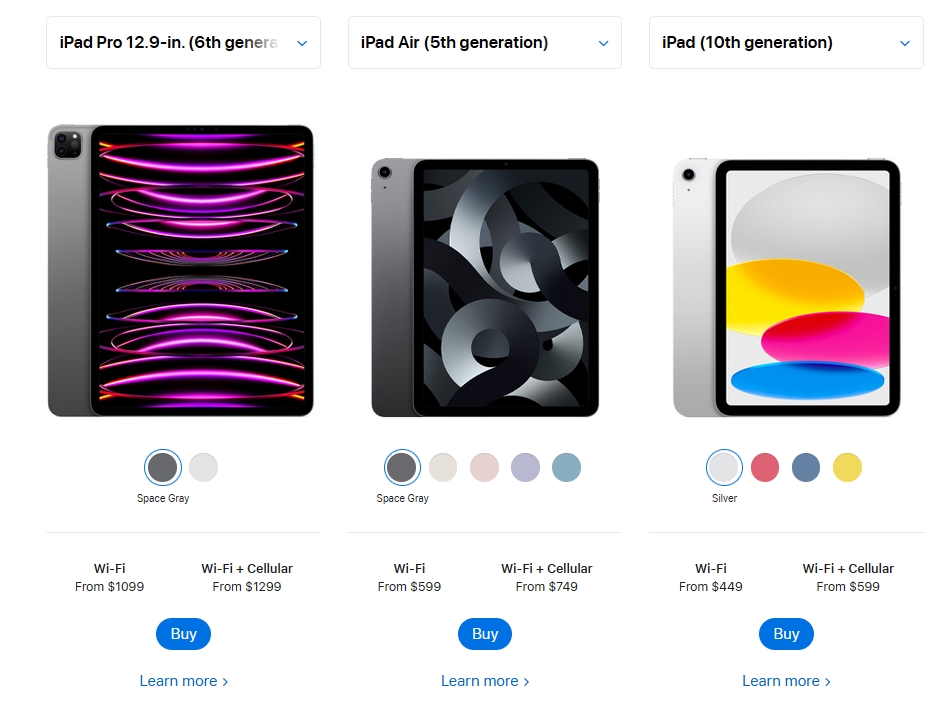Apple's next iPad Pro is said to get some major improvements to the hardware. The tablet will be powered by an M3 chip, and could sport an OLED display.
Next-gen iPad Pro will have an OLED display and M3 chip
Apple launched the sixth-gen iPad Pro (pictured above) and the iPad 10th-gen in October 2022. While the regular iPad models have Bionic chips like the iPhone, the iPad Pro lineup has a more potent SoC, they are equipped with Apple Silicon chips. These are the same SoCs that power Macs, and are really powerful. Mark Gurman, writes in his weekly PowerOn newsletter, that the iPad Pro 7th-gen will feature an M3 chip.
Apple is yet to unveil the M3, the Cupertino company has been testing the chipset across its Mac lineup, and for its new tablet. The SoC could be announced in October, along with new Macs.
The display on the next-gen iPad will be an OLED screen, just like what we have had on the iPhone, since the iPhone X which came out in 2017. The iPad Pro will come in 2 models; one with an 11-inch display, while the other has a 13-inch screen, similar to Apple's biggest iPad which is 12.9 inches. The new iPads are codenamed J717, J718, J720 and J721. Apple is also improving the Magic Keyboard, it will have a new design with a larger trackpad. This would reportedly look closer to a laptop's keyboard.
Gurman notes that iPad unit shipments declined 17% in the second quarter. Apple blamed it on comparisons with the sales driven during the pandemic.

Apple sells 4 different iPad models; the iPad 10th-gen, iPad Mini, iPad Air and iPad Pro. Of course, you can also buy the iPad 9th-gen too. While you could argue that these models target different budgets, they can be quite confusing from a consumer's perspective, aka buyer's dilemma. Which one should you buy? Some of these have similar sized displays, and the only difference between them could be the processor or camera, but would you pay $200 more for them? Things like these could affect sales numbers, not to mention that people don't upgrade to new devices every year.
Phones are getting bigger screens, and people may opt for a laptop over a tablet, for work and studying.
Apple needs to step up its iPad software strategy
Apple has constantly been upgrading the hardware on iPad every year, the ProMotion display and the LiDAR sensor are notable examples of this. The problem isn't the tech, it's a software issue. It feels like iPadOS is holding back the tablet, especially on the iPad Pro version. Apps on the iPad are barely better than their iPhone counterparts, and the fact that they are restricted to the App Store isn't helping either. Sideloading is not yet a reality.
Don't get me wrong, the iPad Pro is great for reading, watching videos, playing games, or just browsing the web. But the regular iPad can do all these too, and at a significantly lower price tag. Even accessories like the Apple Pencil add little value to the iPad Pro, because of toned-down versions of desktop apps. Apple tried to make iPadOS more useful by adding features like Stage Manager for multitasking, and professional tools like Final Cut Pro and Logic Pro, but they really haven't improved the experience by much.
This is the reason why iPad sales are declining. A user may like the MacBook Air more, because it offers a much better experience. If the iPad is equipped with an Apple Silicon chip, why not just let it run on macOS? This would allow the device to function like a proper laptop, and users could install Mac apps on it. It might make the tablet more useful, and actually drive sales. It already supports a keyboard with a trackpad, and also lets you connect an external display.
Apple has no plans to unveil a new iPad next month during the iPhone 15 and Watch Series 9 launch event. Gurman says that the next gen iPad Pro could debut in 2024, during Spring or early Summer.
Thank you for being a Ghacks reader. The post Apple's next iPad Pro could have an OLED display, improved keyboard with a bigger trackpad appeared first on gHacks Technology News.

0 Commentaires